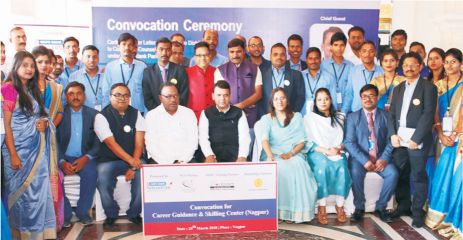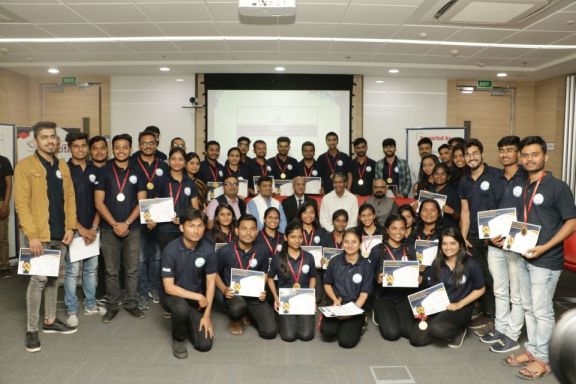FUEL (Friends Union For Energising Lives) is a non-profit organisation focused on assisting students with education and career opportunities. In an exclusive interview for our print magazine, Ketan Deshpande, Pavate Research Fellow at University of Cambridge, UK Ashoka Fellow, Founder Chairman & CEO, FUEL, talked about gaps in the higher education system, working with the private sector and how CSR can enhance the education scenario.
Q 1. What inspires you to work in the social sector?
I started FUEL at age 19, when I suffered due to lack of career information and it motivated me to write a book on careers. Dr Abdul Kalam was the President of India then and he used to respond to letters from young people. I wrote a letter and sent him a copy of my book. He liked it and invited us for a discussion at Raj Bhavan on his visit to Pune. I remember, he said: ‘Young people like you & Santosh (Chief Mentor of FUEL) should guide and bring education opportunities to 1 million youth of India’. This was my inspiration to run FUEL, so it aptly stands for ‘Friends Union For Energising Lives’.
Q 2. Education is a stepping stone to a successful future. However, Right to Education in India does not equate Right to Learning. Do you agree?
Recently, I had the opportunity to visit a cooperative university in Germany which runs a model wherein a company selects students before they enter formal education and for half the duration of the course, they are on the company site or shop
floor. In my opinion, the model of our medical internship, which is compulsory for graduates, could be replicated for all courses. It could be a gamechanger for increasing learning levels among youth.
Q 3. How can various sections of society contribute towards improving the quality of education in India?
The critical challenge we face is quality teaching for which various sections can contribute by sharing their expertise. Volunteering programmes like “School Chale Hum” by FUEL where volunteers can go back to their own school to deliver seminars or scholarship programmes like the portal gyandaan.org launched by us wherein all sections of society can contribute towards the future of our Nation. Our programme “Edu-Raksha” for the children of army jawans boosts the morale of their families through career counseling.

Q 4. Education does not always make an individual employable. What are some of the soft skills that should be inculcated right from school years?
Life skills, value-based education in the beginning years and digital literacy skills are specially powerful tools contributing to knowledge. Internships, industry visits and volunteering at events can make youth employable.
Soft skills like communication, confidence building, adaptability, time management, interpersonal skills, social skills and stress management are some skills that need to be nurtured and inculcated from the school years itself.
Q 5. What are your views on the new norms of the CSR mandate? How do you think they would contribute in bridging the gap between educated youth and unemployment?
The new CSR norms are welcome, especially with the emphasis given on future skills, research and incubating entrepreneurs. Future skill development and education initiatives are among the top projects being undertaken by various corporates. Scholarships and future skills development for the weaker sections of society could help in bridging the gap between educated youth and unemployment.
Q 6. What do corporates need to do now to ensure that India is able to get the demographic dividend to its maximum potential for tomorrow?
Concerning CSR, one important issue is that the implementing agencies which are social non-profit organisations are trying to solve the most complex issues of the country, but do they have adequate talent which could be retained and supported?
Globally, a lot of investment goes into building capacity of social organisations and their leadership. Are we doing that here?’ It is important that corporates present answers to this question to get the maximum out of social organisations who are helping the youth and country for its demographic dividend advantage.
Q 7. How does FUEL contribute in achieving the SDG targets of India?
FUEL works with SDG 4 of Quality Education by providing career counselling and its talent search programme with an emphasis on academic coaching and scholarships to needy girls from Govt schools and soldiers’ children. Our work on Future Skills Training in new age skills of machine learning, digital technology aligns with SDG 8 of Decent Work and Economic Growth.

Q 8. What is the purpose of FUEL’s Aptitude Talent Search Olympiad?
We run the Olympiad for 2 sets of students: one for Class IX to XII and another for Pre & Final Year graduates. For students of Class IX to XII, the aptitude along with personality / interest Olympiad is to recommend career clusters. We also use the scores for awarding various scholarships and coaching programmes which we implement for different corporates in India. The aptitude Olympiad acts as qualifying test for the Talent Search coaching and Scholarship programmes.
For Pre and Final Year graduates, the Aptitude Olympiad is crucial before job interviews. We implement Future Skills Training at various colleges pan-India, and the major feedback received by recruiters is that most graduates cannot qualify for the recruitment process due to low scores in aptitude screening and communication skills. Considering this, we started this competition among colleges and students.
FUEL’s Aptitude Talent Search Olympiad this year has more than 15,000 youth competing in 75 colleges. Top students are awarded on unique categories like best resume, best LinkedIn profile and, along with top scorers of aptitude tests, are eligible for free Future Skills Training and mock placement drives.
Q 9. What is the process of impact measurement at FUEL? How do you ensure that deserving candidates benefit from the vocational training and scholarship programmes?
We run an effective screening process for deserving student in the following ways:
- Creating awareness about the programme amongst the expected beneficiaries is done through workshops.
- Collecting data through collaborations with Govt bodies like AICTE, Niti Aayog, district administration and by visiting schools, colleges, institutes.
- Screening test and aptitude test conducted to examine beneficiaries, domain & aptitude for particular fields.
- Home visits and counselling are conducted at the beneficiary’s home by selected volunteers in order to take the family into confidence. A detailed need assessment questionnaire is filled out during this stage. Rules and regulations are conveyed to students.
- The final procedure of academic and industry interview is also conducted. Letters of recommendation are examined at this stage.
The process of impact measurement for our Education programme is through pre and post assessment along with percentage changes in academic scores in respective subjects and admission ranking in colleges. For our Future Skills training programme, along with feedback, a number of people received employment and interview calls.
Q 10. What is your vision for the youth of our country?
My vision is that no student should miss his or her career opportunity due to financial constraints or lack of training.
This could be achieved through movement where we practise endowment scholarships for the needy, volunteering-led models of internships, teaching through the blended learning approach with technology, and ground implementation by effective social organisations.
We at FUEL wish to set up cooperative a Future Skills University at 5 locations for the Children of Farmers and Soldiers, with the unique support of corporate India and distinguished philanthropists.
This interview appears in the current edition of our print magazine. Click here to grab a copy
Thank you for reading. In addition, your thoughts and inputs will genuinely make a difference to us. Please drop a line and help us do better.
